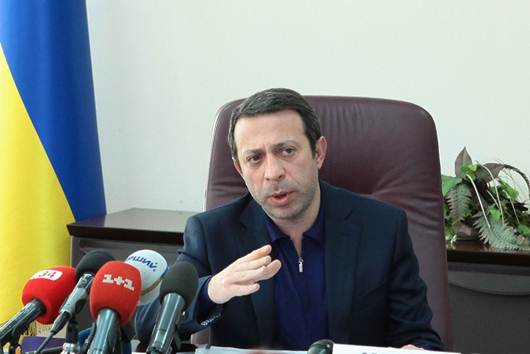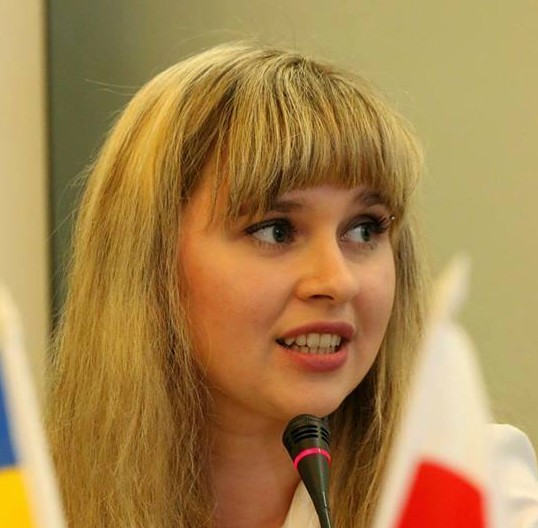One detention and one protest on a Saturday morning

On the morning of October 31st, Hennadiy Korban, one of the Dnipropetrovsk-based UKROP party leaders, was detained by the Security Service of Ukraine (SBU). UKROP's Kyiv and Dnipropetrovsk party offices were searched, as well as the the UKROP affiliated volunteering organization. According to the party's lawyers, documents justifying investigative action were not provided, and the right to legal aid was denied. Journalists were barred from the scene without any legal justification.
The Office of the Prosecutor General (PGO) and the Security Service later explained that it was a “special operation, aimed at liquidating an organized crime group.” Korban is suspected to be the leader. Key accusations deal with property theft and kidnapping. According to PGO and SBU, approximately 500 Security Service’s workers were involved, and the operation had been prepared for months. Any political motives were discarded.
On the same morning of October 31st, a motorcade filled with around 100 vehicles reached President Poroshenko’s residence. Activists from the Automaidan movement came to demand Prosecutor General Victor Shokin's dismissal. Both Ukrainian civil society and Western partners claim that he is the main advocate of corruption in Ukraine. Direct allegations in undermining the fight against corruption have recently come from the US Ambassador to Ukraine, Geoffrey Pyatt.
AutoMaidan claims the presidential residence was guarded by “titushkas” (recruited hooligans) and riot police squads, and the road was deliberately blocked by private cars. „No one came to talk to us from the president’s house, though even during our motorcades to Mezhyhirya (former Yanukovych’s residence – ed.) representatives of Yanukovych would come out,” the activists said.
The Presidential Administration didn’t comment on this incident.
Society wants to see the fight against corruption
The connection between the two stories may lie in the official stance of Ukraine's presidential party, the Petro Poroshenko Block, expressed by its First Deputy Head Ihor Kononenko. “The recent challenges of our society are such that the society wants to see the fight against corruption, the society wants to see illegal gangs’ disarmament," he explained answering the question about Hennadiy Korban’s detention.
Society and Western creditors want to see the fight against corruption, as the authorities zealously stage it. Holding the PGO accountable for backing corruption and professional inactivity gets replaced by their political rivals’ persecution. Even more: from a potential culprit, PGO turns into a hero fighter against organized crime.
Viktor Shokin started heading the PGO after his predecessor’s team had failed the Maidan shootings’ investigation, as well as performing lustration (purification) among its members. A sixty-four year old functionary has more than 40 years experience in PGO, half of which was during soviet times. Such a profile doesn’t correspond to Maidan activists’ expectations; in the winter of 2015 he was given a chance.
Almost a year later, Shokin’s PGO hasn’t moved a step closer to the Maidan shooting investigation, though they have ‘succeeded’ in covering the bribe taking prosecutors and refusing to comply with the Action Plan on Visa Liberalization requirements. The latter endangers Ukraine’s European integration, specifically visa regime cancellation.
Hennadiy Korban is one of the leaders of the UKROP party backed by oligarch Ihor Kolomoyskyi. When asked about the motives of running for his parliament seat in July 2015 by-elections, he promised to use his immunity from the ruling authorities and “disembowel” them. Before becoming a politician, he’s been known as the "corporate raider #1" due to activities which Korban characterized as "wealth redistribution." According to Korban, before his recent arrest “eight or nine” criminal proceedings have been initiated against him.
Korban is one of the allies of the oligarch and Dnipropetrovsk Oblast ex-governor Ihor Kolomoyski. Known for "having saved the region from separatism," he came into a standoff with the president over state-owned oil-producing company “Ukrnafta.” After the conflict, Kolomoyski and his team resigned from governing the Dnipropetrovsk Oblast to work on creating the UKROP party, the key pro-Ukrainian competitor for the presidential Solidarity party.
Poroshenko’s Ukraine close to fail European integration
“We support the investigation against everyone suspected of committing crimes regardless their party affiliation or positions held… At the same time, state apparatus of coercion and punishment is to be used for implementation policy of inevitability of punishment, not for persecution of the political opponents,” says the statement by the parliamentary “Euro-optimists” group uniting members of different parties.
Ukraine, which has failed to investigate the almost two year old crimes of shooting and torturing Maidan activists, separatism and war crimes, as well as letting Yanukovych regime officials escape the prosecution and run away abroad, demonstrates a fascinating ability of persecuting whoever poses danger to the political establishment. The methods used are no different from the ones by Yanukovych's regime, the consequences may lead to failed integration with Europe, which is exactly what Yanukovych wanted to accomplish.




